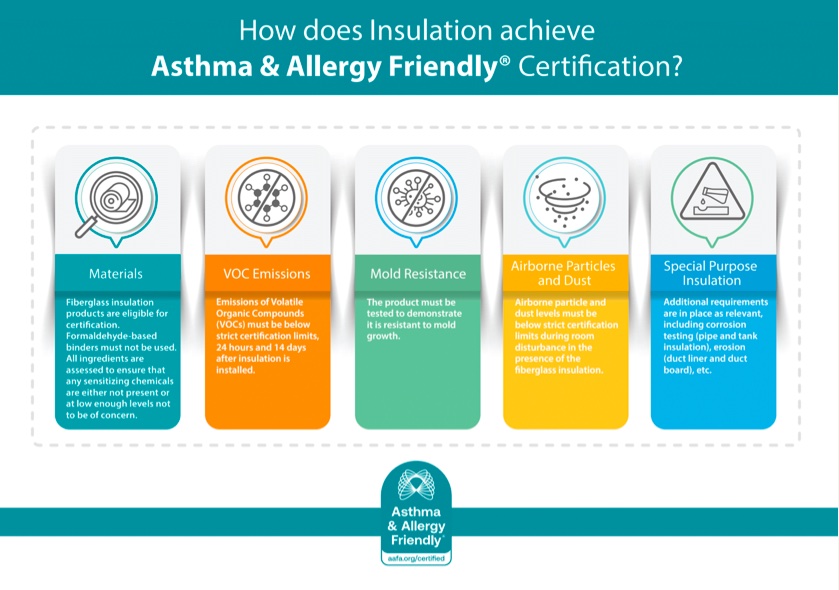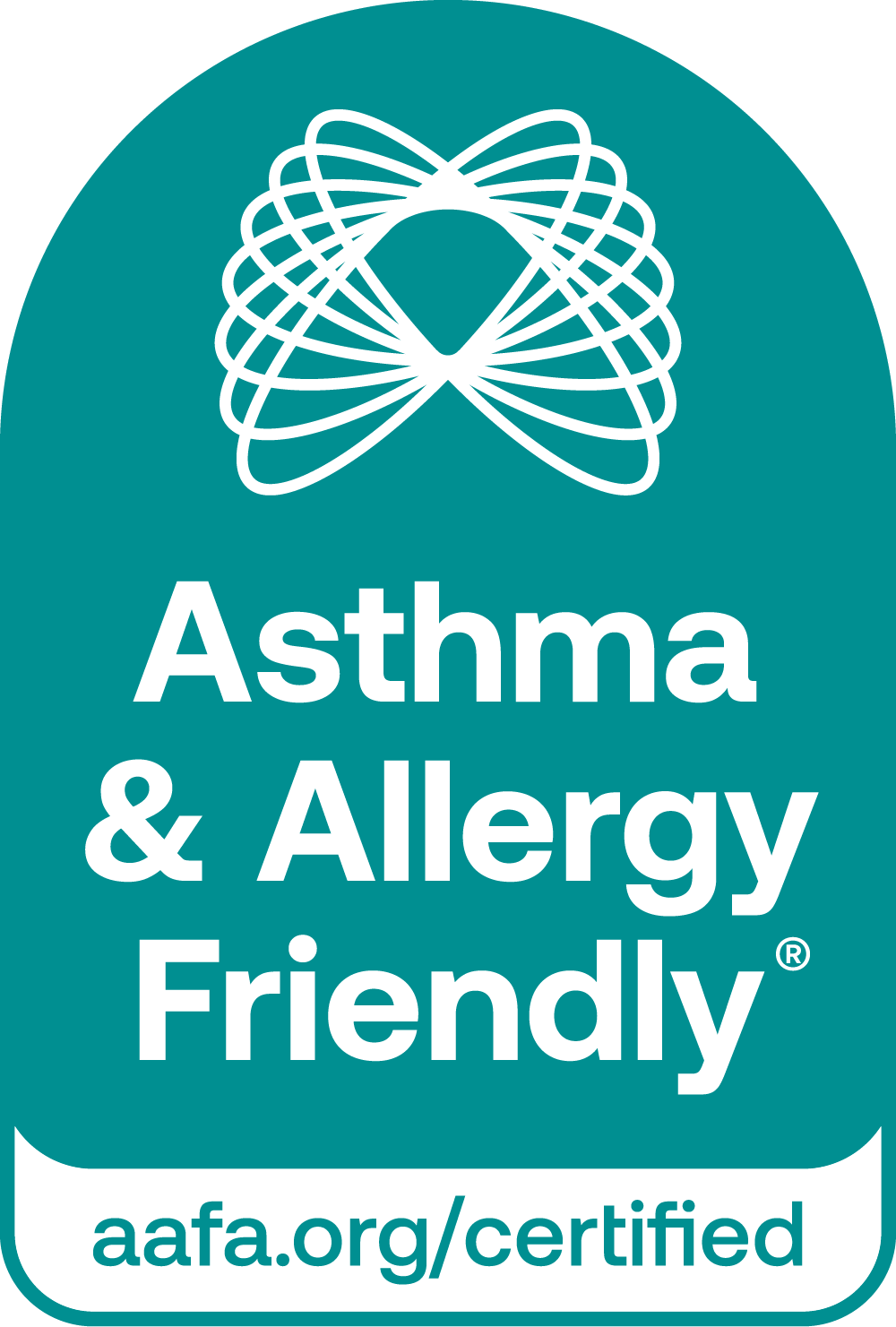Selecting Certified insulation ensures healthier living environments by reducing allergens, harmful chemicals, and mold growth, particularly for individuals with asthma and allergies
This May marks Asthma and Allergy Awareness Month, and we are continuing to highlight the issue of indoor air quality (IAQ) and its impact on people with asthma and allergies. With over 100 million Americans affected by these conditions, the indoor environment plays a key role in managing symptoms. May is also National Building Safety Month, a time to recognize the importance of building safety and ensure that the structures we live and work in support the health and well-being of occupants.
One area where this impact is particularly significant is insulation. Because it is hidden behind walls and out of sight, it can easily be overlooked, yet insulation plays a crucial role in supporting healthier indoor air quality (IAQ).
In this article, we’ll explore how insulation impacts IAQ, highlight the importance of selecting certified products, and introduce our Certified partner Knauf North America, a leader in insulation innovation committed to improving indoor air quality.
Why Indoor Air Quality Matters
Indoor air quality affects everyone, but it’s especially critical for individuals with asthma or allergies. Every day, we breathe in over 2,000 gallons of air – enough to fill a standard swimming pool. This air can carry dust, pollen, pet dander, and other airborne allergens, all of which can trigger asthma attacks and allergic reactions. According to recent research, 90% of dust in homes contains harmful chemicals, including flame retardants, which can worsen respiratory conditions. Insulation materials, which are typically installed in walls, attics, and floors, can contribute to or alleviate these issues depending on the materials used.
Choosing the right insulation can help reduce allergens, limit exposure to harmful chemicals, and prevent the growth of mold. Understanding how insulation impacts IAQ can help homeowners make more informed decisions about their building materials, especially when aiming to create healthier living environments.
How Insulation Affects Indoor Air Quality
Insulation plays a significant role in maintaining a comfortable and healthy home by regulating temperature and reducing energy costs. However, not all insulation materials are equal when it comes to IAQ. Some materials can off-gas volatile organic compounds (VOCs) into the air, or encourage mold growth if they retain moisture. When improperly installed or when disturbed, insulation materials can release airborne dust, fibers, and other particles that contribute to poor IAQ. This not only affects residents but also puts installers and workers at risk, as they may be exposed to these harmful particles and chemicals during installation or maintenance.
The Importance of Certified Insulation
To ensure that insulation meets the highest standards for reducing asthma and allergy triggers, it’s essential to choose products that have undergone independent testing. The Asthma & Allergy Friendly® Certification Program helps consumers identify insulation products that have been scientifically proven to meet strict criteria for improving indoor air quality.
Certified insulation products undergo rigorous testing to ensure they meet specific standards. These tests include:
- Materials: Fiberglass insulation products are eligible for certification. All ingredients are assessed to ensure that any sensitizing chemicals are either absent or present at levels not of concern. Formaldehyde-based binders must not be used.
- VOC Emissions: Insulation must meet strict certification limits for Volatile Organic Compounds (VOCs), with emissions tested 24 hours and 14 days after installation to ensure they remain at safe levels.
- Mold Resistance: The insulation product must undergo testing to demonstrate its resistance to mold growth, helping to prevent one of the most common IAQ issues.
- Airborne Particles and Dust: Insulation must meet certification limits for airborne particle and dust levels during room disturbance when fiberglass insulation is present, ensuring minimal impact on indoor air quality.
- Special Purpose Insulation: Additional requirements apply to specific insulation types, such as corrosion testing for pipe and tank insulation or erosion testing for duct liner and duct board.
These tests are carried out in independent, third-party laboratories, ensuring that consumers can trust the certification.

This infographic outlines the five key certification criteria for fiberglass insulation to earn the Asthma & Allergy Friendly® mark: Materials, VOC Emissions, Mold Resistance, Airborne Particles and Dust, and Special Purpose Insulation.
Introducing our Certified Partner: Knauf North America
Knauf North America has been a proud partner of the Asthma & Allergy Friendly® Certification Program since 2021, and their innovation and commitment to healthier indoor environments continue to set them apart in the insulation industry. As a leading, family-owned global manufacturer of fiberglass insulation, Knauf’s focus on improving indoor air quality is evident in their growing range of Certified products. Knauf have expanded their product line to include commercial, residential and pipe & tank insulation offering a wide array of solutions to improve indoor air quality in both homes and workplaces. Their most recent announcement of newly Certified products was made at the 2025 National Insulation Association Convention, marking another key milestone in their ongoing efforts to create healthier spaces.
As Linda McGovern, VP of Marketing and Customer Experience at Knauf North America, shares,
“Our commitment to indoor air quality and sustainability continues to drive innovation at Knauf. With Performance+®, we are raising the bar for insulation and setting a new industry standard that contributes to healthier, safer building environments. From using sustainable materials to pursuing third-party validations like Asthma & Allergy Friendly® Certification, Knauf prioritizes occupant health as a core outcome of its innovation strategy.
Conclusion
As we celebrate Asthma and Allergy Awareness Month, we must consider every aspect of our indoor environments, insulation included. By choosing products like Knauf’s Certified Asthma & Allergy Friendly® insulation, we can create homes that are not only energy-efficient but also have healthier environments for the millions of people affected by asthma and allergies.
Through thoughtful choices and trusted certifications, we can all make a significant impact on the quality of the air we breathe and the health of our homes.
